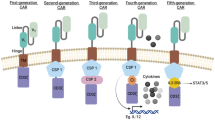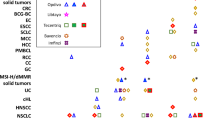Abstract
Ipilimumab is a humanized antibody to CTLA4 and is used to treat cancers refractory to conventional treatment. We treated 21 patients with refractory melanoma or prostate cancer with anti-CTLA4 antibody (ipilimumab), with subsequent development of significant colitis in nine cases. Two of these nine did not respond rapidly to high-dose (2 mg kg−1 day−1) glucocorticoids or infliximab. They required additional immunosuppression, and one ultimately died of opportunistic infection, representing a more refractory course than has previously been described complicating ipilimumab therapy. Both patients had received radiation to the pelvis for prostate cancer less than 1 year prior to receiving ipilimumab. We performed immunohistochemical analysis of colon biopsies from ipilimumab recipients to determine if colitis correlates with depletion of intramucosal FOXP3+ regulatory T cells (Tregs), which normally express CTLA4. However, we found no evidence of FOXP3+ T cell depletion in any of the nine patients who developed colitis.




Similar content being viewed by others
Abbreviations
- CTLA4:
-
Cytotoxic T lymphocyte antigen 4
- GVHD:
-
Graft versus host disease
- IBD:
-
Inflammatory bowel disease
- Tregs:
-
Regulatory T cells
- FOXP3:
-
Forkhead box protein 3 (human nomenclature)
References
Sansom DM, Walker LS. The role of CD28 and cytotoxic T-lymphocyte antigen-4 (CTLA-4) in regulatory T-cell biology. Immunol Rev. 2006;212:131–148. doi:10.1111/j.0105-2896.2006.00419.x.
Waterhouse P, Penninger JM, Timms E, et al. Lymphoproliferative disorders with early lethality in mice deficient in Ctla-4. Science. 1995;270:985–988. doi:10.1126/science.270.5238.985.
O’Day SJ, Hamid O, Urba WJ. Targeting cytotoxic T-lymphocyte antigen-4 (CTLA-4): A novel strategy for the treatment of melanoma and other malignancies. Cancer. 2007;110:2614–2627. doi:10.1002/cncr.23086.
Maker AV, Phan GQ, Attia P, et al. Tumor regression and autoimmunity in patients treated with cytotoxic T lymphocyte-associated antigen 4 blockade and interleukin 2: A phase I/II study. Ann Surg Oncol. 2005;12:1005–1016. doi:10.1245/ASO.2005.03.536.
Phan GQ, Yang JC, Sherry RM, et al. Cancer regression and autoimmunity induced by cytotoxic T lymphocyte-associated antigen 4 blockade in patients with metastatic melanoma. Proc Natl Acad Sci USA. 2003;100:8372–8377. doi:10.1073/pnas.1533209100.
Sanderson K, Scotland R, Lee P, et al. Autoimmunity in a phase I trial of a fully human anti-cytotoxic T-lymphocyte antigen-4 monoclonal antibody with multiple melanoma peptides and Montanide ISA 51 for patients with resected stages III and IV melanoma. J Clin Oncol. 2005;23:741–750. doi:10.1200/JCO.2005.01.128.
Beck KE, Blansfield JA, Tran KQ, et al. Enterocolitis in patients with cancer after antibody blockade of cytotoxic T-lymphocyte-associated antigen 4. J Clin Oncol. 2006;24:2283–2289. doi:10.1200/JCO.2005.04.5716.
Yang JC, Hughes M, Kammula U, et al. Ipilimumab (anti-CTLA4 antibody) causes regression of metastatic renal cell cancer associated with enteritis and hypophysitis. J Immunother. 2007;30:825–830. doi:10.1097/CJI.0b013e318156e47e.
O’Mahony D, Morris JC, Quinn C, et al. A pilot study of CTLA-4 blockade after cancer vaccine failure in patients with advanced malignancy. Clin Cancer Res. 2007;13:958–964. doi:10.1158/1078-0432.CCR-06-1974.
Small EJ, Tchekmedyian NS, Rini BI, Fong L, Lowy I, Allison JP. A pilot trial of CTLA-4 blockade with human anti-CTLA-4 in patients with hormone-refractory prostate cancer. Clin Cancer Res. 2007;13:1810–1815. doi:10.1158/1078-0432.CCR-06-2318.
Read S, Malmstrom V, Powrie F. Cytotoxic T lymphocyte-associated antigen 4 plays an essential role in the function of CD25(+)CD4(+) regulatory cells that control intestinal inflammation. J Exp Med. 2000;192:295–302. doi:10.1084/jem.192.2.295.
Takahashi T, Tagami T, Yamazaki S, et al. Immunologic self-tolerance maintained by CD25(+)CD4(+) regulatory T cells constitutively expressing cytotoxic T lymphocyte-associated antigen 4. J Exp Med. 2000;192:303–310. doi:10.1084/jem.192.2.303.
Jonuleit H, Schmitt E, Stassen M, Tuettenberg A, Knop J, Enk AH. Identification and functional characterization of human CD4(+)CD25(+) T cells with regulatory properties isolated from peripheral blood. J Exp Med. 2001;193:1285–1294. doi:10.1084/jem.193.11.1285.
Read S, Greenwald R, Izcue A, et al. Blockade of CTLA-4 on CD4+ CD25+ regulatory T cells abrogates their function in vivo. J Immunol. 2006;177:4376–4383.
Pentcheva-Hoang T, Egen JG, Wojnoonski K, Allison JP. B7-1 and B7-2 selectively recruit CTLA-4 and CD28 to the immunological synapse. Immunity. 2004;21:401–413. doi:10.1016/j.immuni.2004.06.017.
Epstein RJ, McDonald GB, Sale GE, Shulman HM, Thomas ED. The diagnostic accuracy of the rectal biopsy in acute graft-versus-host disease: A prospective study of thirteen patients. Gastroenterology. 1980;78:764–771.
Acknowledgments
This work was supported by the National Institutes of Health AI48779 AI007411 (JDL) and CA18029 (RCH, GBM), as well as clinical funds from the University of Washington and the Seattle Cancer Care Alliance.
Financial Disclosures
None of the authors have personal financial relationships to disclose. However, subjects with melanoma were participants in a trial funded by the Bristol-Myers Squibb company, for which John Thompson was an investigator. Subjects with prostate cancer were participants in a trial funded by the Medarex company, for which Celestia Higano was an investigator and Deborah Chielens was a coordinator.
Author information
Authors and Affiliations
Corresponding author
Rights and permissions
About this article
Cite this article
Lord, J.D., Hackman, R.C., Moklebust, A. et al. Refractory Colitis Following Anti-CTLA4 Antibody Therapy: Analysis of Mucosal FOXP3+ T Cells. Dig Dis Sci 55, 1396–1405 (2010). https://doi.org/10.1007/s10620-009-0839-8
Received:
Accepted:
Published:
Issue Date:
DOI: https://doi.org/10.1007/s10620-009-0839-8




